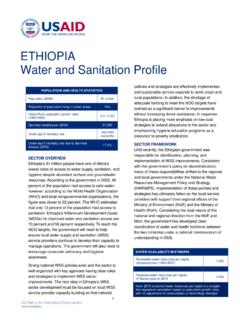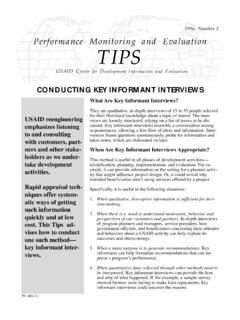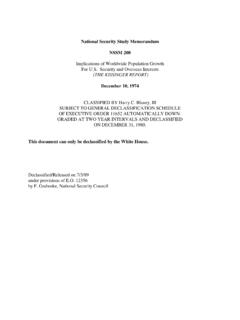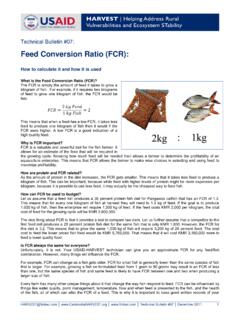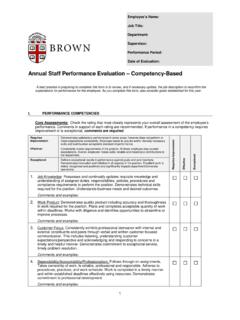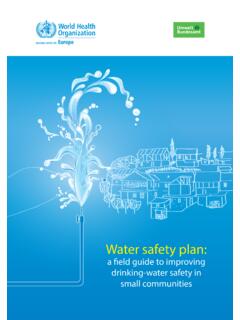Transcription of Improving Interpersonal Communication Between Health Care ...
1 Quality Assurance Project7200 Wisconsin Avenue, Suite 600 Bethesda, MD 20814 USA301/654-8338, FAX 301 Assurance Methodology Refinement SeriesByB reng re de NegriLori DiPrete BrownOrlando Hern ndezJulia RosenbaumDebra Roter Improving Interpersonal CommunicationBetween Health Care Providersand ClientsContentsContentsContentsContentsC ontentsPart 1A Conceptual Framework for Interpersonal CommunicationI. Introduction .. 7II. Background .. 9 III. Why Is Interpersonal Communication (IPC) Important? .. 10IV. What Are the Characteristics of Effective IPC? .. 10V. Guidelines and Norms for Effective IPC .. 15VI. Planning and Implementing Training Activities .. 20 VII. Case Studies .. 25 Part 2 Case StudiesA. HondurasB. Trinidad and TobagoC. EgyptAppendicesA. Job AidB. Training Manual for IPC (Egypt)C. Training Manual for IPC (Trinidad and Tobago)D.
2 Training Manual for IPC (Honduras)E. Data Collection ToolsInstrument 1: The Roter Interaction Analysis System (RIAS)Instrument 2: Health Provider s Observation Check ListInstrument 3: Physician QuestionnaireInstrument 4: Patient Exit Interview (English)Instrument 5: Patient Exit Interview (Spanish)F. Annotated Bibliography45 Part 1 Part 1 Part 1 Part 1 Part 1A Conceptual FrameworkA Conceptual FrameworkA Conceptual FrameworkA Conceptual FrameworkA Conceptual Frameworkfor Interpersonal Communicationfor Interpersonal Communicationfor Interpersonal Communicationfor Interpersonal Communicationfor Interpersonal Communication 67 Improving Interpersonal Communication BetweenHealth Care Providers and ClientsI. IntroductionI. IntroductionI. IntroductionI. IntroductionI. IntroductionEffective Interpersonal Communication (IPC) Between Health care provider and client is oneof the most important elements for Improving client satisfaction, compliance and Health out-comes.
3 Patients who understand the nature of their illness and its treatment, and who be-lieve the provider is concerned about their well-being, show greater satisfaction with the carereceived and are more likely to comply with treatment regimes. Despite widespreadacknowledgement of the importance of Interpersonal Communication , the subject is not al-ways emphasized in medical the past 30 years substantial investments have been made to enhance access to basichealth services in developing countries. However, there have been relatively few studies thatinvestigate the quality of the services delivered, and fewer still that study the quality of in-terpersonal The quality of care research that has been done shows thathealth counseling and provider-client Communication are consistently weak across countries,regions and Health Even when providers know what messages to communicate,they do not have the Interpersonal skills to communicate them most effectively.
4 They oftendo not know how to communicate with their patients. Despite widespread acknowledgementof the critical importance of face-to-face Communication Between client and provider, thereare few rigorous studies of Health Communication in developing of positive Health outcomes associated with effective Communication from devel-oped countries is strong. Patient satisfaction, recall of information, compliance with thera-peutic regimens and appointment keeping, as well as improvements in physiological markerssuch as blood pressure and blood glucose levels and functional status measures have all beenlinked to provider-client Thus, experience in the developed world has shownthat providers can improve their Interpersonal skills, leading to better Health outcomes. Theresearch described here explores whether these findings are valid and replicable in the de-veloping Roemer MI, Montoya-Aguilar C.
5 Quality assessment and assurance in primary Health care. Geneva: WHO Off set Publica-tion, Nicholas DD, Heiby JR, Hatzell TA. The Quality Assurance Project: introducing quality improvement to primary healthcare in less developed countries. Quality Assurance in Health Care 1991, 3(3) Loevinsohn BP. Health Education Interventions in Developing Countries: A Methodological Review of Published Journal of Epidemiology 1990 Dec:19(4) Hall J, Roter D, and Katz N. Correlates of provider behavior: a meta-analysis. Medical Care 1988 26 , effective Communication does not always occur naturally, nor it is easily ac-quired. Even when client and provider come from the same geographic area and speak thesame language, they often have different educational, socio-economic and cultural back-grounds. Moreover, their expectations about the Health encounter may be different, or theymay be faced with other problems, such as lack of privacy during the encounter, or timeconstraints due to heavy patient Communication leads to extended dialogue which enables patients to disclose criticalinformation about their Health problems and providers to make more accurate Communication enhances Health care education and counseling, resulting in more ap-propriate treatment regimes and better patient compliance.
6 Effective Interpersonal commu-nication also benefits the Health system as a whole by making it more efficient and costeffective. Thus, clients, providers, administrators and policy makers all have a stake inimproved provider-client monograph discusses the importance of IPC as a tool for Improving Health care out-comes in developing countries and describes techniques for enhancing provider communica-tion skills. It also provides a job aid and several data collection instruments that can be usedin various settings. Our field experiences in Honduras, Egypt and Trinidad, described laterin the text, suggest that test results in developed countries are valid and replicable in devel-oping countries. Therefore, we hope that our findings will serve as useful models for imple-menting future Interpersonal Communication programs, and that the monograph will helpinterested Health care policy makers and practitioners improve the quality of Health care intheir facilities through improved Interpersonal Communication .
7 The monograph can serveas:uan introductory overview on provider-client Communication skillsua framework for assessing IPC skillsua guide for developing IPC training activitiesua resource describing important IPC experiences in selected developing each Health care setting requires locally-appropriate strategies, the guide prov idesonly a general framework for action, leaving Health care policy makers, managers and pro-viders to develop their own analyses and interventions. Therefore, we encourage readers tomodify the content of the monograph as needed and to develop locally-appropriate examplesfor training and other IPC BackgroundII. BackgroundII. BackgroundII. BackgroundII. BackgroundThe research and training activities reported here were carried out by an inter-disciplinaryteam of experts in Health service delivery, counseling, Health Communication and effort began with a literature review5 to assess current knowledge on client-prov ider com-munications in both developed and developing countries, and to identify the critical issuesthat needed to be addressed in developing the literature review, we developed a set of IPC guidelines for Health care The guidelines drew on counseling and IPC themes found in the professional literatureand on insights gained from the cross-cultural field experiences of our preparing a preliminary set of guidelines, we developed the format and materials forprovider training workshops based on cross-cultural insights into IPC.
8 We found that pro-vider-client Communication problems exist worldwide, and that several principles about goodcommunication can be generalized. We expect that IPC improvement initiatives could buildon universal principles to develop effective solutions that take into account local socio-cul-tural factors and resources at , we field-tested our materials in three different developing country settings andcollaborated with local Health care providers to tailor the IPC guidelines and training courseto local socio-cultural environments. Collaboration in Honduras, Trinidad and Egypt enabledus to refine the guidelines and test our methods for training providers on how to apply theguidelines. Following each workshop, we conducted evaluation and observation surveys amongtrainees to gauge training effectiveness. We found that providers could improve IPC practiceswith patients in small but important ways, to the greater satisfaction of all For themost part, physicians were willing to apply IPC skills once they were convinced that use ofthe techniques would not necessarily lengthen medical visits and that concrete skills couldbe mastered through short training programs that emphasized practical approaches.
9 A de-tailed description and analysis of the three country programs is presented Quality Assurance Project Working Group on Counseling and Health Communication Annotated Bibliography April 1992,Bethesda, MD. (See Appendix F)6 It is important to acknowledge that both clients and prov iders contribute to successful Communication in medical encoun-ters. While it would be possible to intervene on either side of this relationship, we have chosen to focus on Health careproviders, since most providers do not currently have, or practice, many of the basic com munications skills that wouldenable them to carry out their responsibilities efficiently and cost-effectively. We recognize that it would also be importantto work with Health care clients, to help them become aware of their rights, to encourage them to ask questions, and tofamiliarize them with basic information that allows them to take full advantage of the Health care system.
10 Such interven-tions are outside the scope of this monograph, but are considered by the researchers to be v ital topics for future DiPrete Brown, Lori, et al. Training in Interpersonal Communication : An Evaluation of Prov ider Perspectives and Impacton Performance in Honduras ; March 1995; Quality Assurance Project, Bethesda, MD. (Included here as Case Study A)10 III. Why Is Interpersonal Communication Important?III. Why Is Interpersonal Communication Important?III. Why Is Interpersonal Communication Important?III. Why Is Interpersonal Communication Important?III. Why Is Interpersonal Communication Important?IPC is important because it leads directly to better Health outcomes. A pathway is clearlyestablished which links processes, such as the way Health care providers communicate, toproximate outcomes, such as patient satisfaction and recall, to final outcomes, such as cli-ent compliance with treatment regimes and improved Health results.

